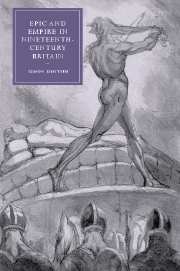Book contents
- Frontmatter
- Contents
- Acknowledgements
- Introduction
- 1 Homer, Ossian and Modernity
- 2 Walter Scott and Heroic Minstrelsy
- 3 Epic Translation and the National Ballad Metre
- 4 The Matter of Britain and the Search for a National Epic
- 5 ‘As Flat as Fleet Street’: Elizabeth Barrett Browning, Matthew Arnold and George Eliot on Epic and Modernity
- 6 Mapping Epic and Novel
- 7 Epic and the Imperial Theme
- 8 Kipling, Bard of Empire
- 9 Epic and the Subject Peoples of Empire
- 10 Coda: Some Homeric Futures
- Notes
- Bibliography
- Index
- CAMBRIDGE STUDIES IN NINETEENTH-CENTURY LITERATURE AND CULTURE
4 - The Matter of Britain and the Search for a National Epic
Published online by Cambridge University Press: 22 September 2009
- Frontmatter
- Contents
- Acknowledgements
- Introduction
- 1 Homer, Ossian and Modernity
- 2 Walter Scott and Heroic Minstrelsy
- 3 Epic Translation and the National Ballad Metre
- 4 The Matter of Britain and the Search for a National Epic
- 5 ‘As Flat as Fleet Street’: Elizabeth Barrett Browning, Matthew Arnold and George Eliot on Epic and Modernity
- 6 Mapping Epic and Novel
- 7 Epic and the Imperial Theme
- 8 Kipling, Bard of Empire
- 9 Epic and the Subject Peoples of Empire
- 10 Coda: Some Homeric Futures
- Notes
- Bibliography
- Index
- CAMBRIDGE STUDIES IN NINETEENTH-CENTURY LITERATURE AND CULTURE
Summary
The previous chapter discussed the matter of translation: how to deal with the inevitable paradoxes created for the translator when dealing with epic material understood as emerging from a stage of society different from that of the present. Some of the same problems emerge, however, when an author seeks to write an original epic, or at least seeks to write in an heroic idiom in a world now defined as categorically unheroic. This is but the outward and visible sign of a deeper perplexity: how to create a national epic, or recast the materials of one, in a modernity that is bound to understand all such efforts as inherently anachronistic.
CARLYLE AND THE IDEA OF A NATIONAL EPIC
I start with the eccentric but unavoidable figure of Thomas Carlyle. Writing in Past and Present in 1843, he sought to found a viable vision of the future of ‘Britain’ (I put the word for the time being in scare quotes) on the capacity of its Captains of Industry (his coinage in this very text) to rediscover a heroic sense of the world beyond the essentially barbaric aim of making money. This will involve, he asserts, the reimposition of order and high purpose on the chaos of existing society:
Difficult? [he asks]. Yes, it will be difficult. The short-fibre cotton; that too was difficult. The waste cotton-shrub, long useless, disobedient, as the thistle by the way-side, – have ye not conquered it; made it into beautiful bandana webs; white woven shirts for men; bright tinted air-garments wherein flit goddesses?[…]
- Type
- Chapter
- Information
- Epic and Empire in Nineteenth-Century Britain , pp. 64 - 83Publisher: Cambridge University PressPrint publication year: 2006



